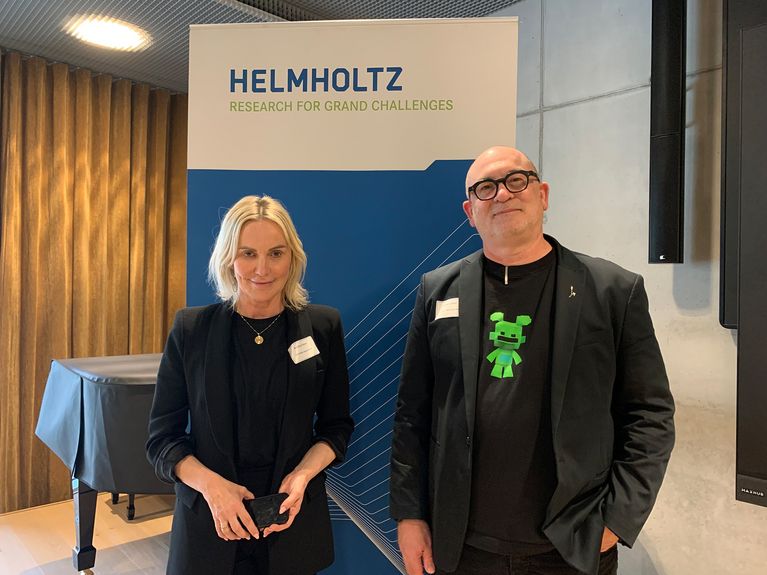Interview
Mind the Gap & Innovate!

Andrea Frahm (Head of Helmholtz Israel Office) and Amnon Dekel (Executive Director von ASPER-HUJI-Innovate). Picture: Helmholtz
Students and scientists from the Helmholtz Association met in Berlin to take part in an Accelerator Bootcamp. In this interview, Andrea Frahm, Head of Helmholtz Israel Office, and Amnon Dekel, Executive Director of ASPER-HUJI-Innovate, talk about the aims of the programme and the special features of this year's edition.
Mind The Gap & Innovate - what exactly does the title signify?
Amnon: Typically, the phrase "Mind the Gap!" greets commuters in train stations, serving as a cautionary alert: "Beware! There's potential danger ahead. Proceed with caution!" However, beyond its immediate warning, "Mind the Gap!" symbolizes transition – whether between platforms or even across geographical boundaries. This notion of transition was at the core of our workshop's inception three years ago. Our aim was to empower young scientists within the Helmholtz community to leverage their expertise in niche research areas swiftly, yielding tangible contributions to global betterment. Our vision? Accelerating impactful innovations, ideally within the year, rather than a decade or two down the line.
What prompted the initiation of the workshop program in 2021?
Andrea: The motivation behind launching the workshop program in 2021 stemmed from the Helmholtz Israel Office's commitment to fostering a strong connection between the Helmholtz Centers and Israel's vibrant innovation ecosystem. Our goal was to facilitate a meaningful exchange wherein our scientists and students could draw inspiration from Israel's prowess in entrepreneurship and innovation. In collaboration with EIT Hub Israel and the Center for Innovation & Entrepreneurship at Hebrew University (ASPER-HUJI-Innovate), we tailored a workshop format in 2021 specifically designed for our startup-savvy researchers.
How do you select participants?
Andrea: Initially, I engage with the Technology Transfer Offices (TTOs) and international working groups across our 18 centers, informing them about the workshop program and soliciting their assistance in identifying potential participants. Subsequently, we evaluate applications based on various criteria, including representation from different centers, project development stages, and the inclusion of established companies. Our aim is to curate a diverse and balanced cohort for each workshop.
What challenges do you face as instructors?
Amnon: One challenge lies in accommodating participants with varying levels of project readiness, from well-defined concepts to nascent ideas. Our objective isn't for attendees to leave with fully-fledged products within the workshop's timeframe. Rather, success for us entails equipping participants with a clearer understanding of the initial steps crucial for a successful spin-off venture.
Tell us about your decision to host the workshop in Berlin?
Amnon: Acknowledging geopolitical complexities, such as the ongoing conflict and the situation of Palestinians, guided our decision-making process. Despite these challenges, nurturing collaborations like this one with the Helmholtz Association remains paramount. Personally, leading the workshop in Berlin holds significant importance, given my familial ties to the city. It symbolizes hope for progress and a brighter future, both globally and domestically.
Can you describe the workshops held in Tel Aviv in 2021 and 2022? Are there any differences between the workshops in Tel Aviv and the current edition in Berlin?
Andrea: Previous editions involved participants spending a week in Israel, immersing themselves in the dynamic local ecosystem. Alongside workshop modules focused on entrepreneurship, participants engaged with research institutes and met with representatives from the Israel Innovation Authority. Personal and in-depth interactions with established scientific Israeli spin-offs enrich the overall experience and are one of the main ingredients of our workshop format in order to foster invaluable insights. Unfortunately, this aspect is missing in our 2 ½ day edition in Berlin. It's crucial that those who shape the workshop have practical experience as business founders—just like Amnon and myself. Both of us have founded companies in the past, so we know what we're talking about and what we aim to convey to the participants.
Amnon: Due to time constraints in Berlin, this year's workshop is more condensed, focusing solely on entrepreneurial aspects such as market research, storytelling, and a culminating pitching event.
What are your future plans?
Andrea: We aim to host an alumni meeting in Berlin in June and plan to convene for the next workshop edition in November, hopefully returning to Tel Aviv.
Readers comments